In Detroit: No Money, No Water
Water Department cuts connections to thousands of city’s poor
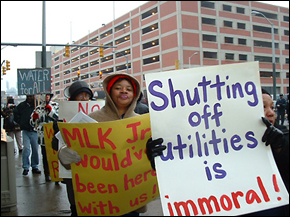
By Brett Walton
Circle of Blue
Detroit’s water utility supplied 20 percent less water in 2009 than it did in 2003. The obvious reasons why are a steep decline in Industrial activity and population. Michigan’s largest city–home to 820,000 residents, 1 million less than in 1950–is losing 10,000 residents annually.
But a third important source of the department’s diminishing market is that many poor residents simply can’t afford the basic service. Thousands of Detroit residents have had their water connections cut by the city, forcing people to adopt informal methods to gain access to drinking water.
“I’ve been to some neighborhoods where they run a hose through the window from their neighbor’s house,” said Maureen Taylor, chair of the Michigan Welfare Rights Organization (MWRO), which educates low-income workers and welfare recipients on social services rights.
“I’ve seen hoses from house to house. I’ve seen people with big water canisters getting water from the neighbors. Most folks understand the situation and give a hand.”
More than 42,000 residences in 2005 lost their connection to the city’s water system, according to figures provided by the Detroit Water and Sewerage Department, Taylor said. The number of homes without access has decreased since then but, according to Taylor, the exact figure remains unknown because DWSD is reluctant to provide data about the shut offs.
DWSD officials, despite requests from Circle of Blue, were not available for comment.
The drop in Detroit’s water has prompted the city’s water utility to increase rates to compensate for lost revenue, a response that is almost certain to accelerate the decline in water demand as homeowners and businesses cut water use to save money. In 2008 the average annual bill increased by almost $55. Last year, the average annual bill rose to almost $83. The DWSD is considering another 9.2 percent increase in July.
Even with these changes, Detroit still has some of the least expensive water of the 20 major U.S. cities surveyed by Circle of Blue.
While many U.S. cities would see a decline in water consumption as an indication that conservation and efficiency programs are working, the drop in Detroit is one more measure of a city in peril. On average one in six Detroit workers is jobless and in some areas half of the population is out of work, according to Taylor, who has led MWRO since 1993. Many people who lost their job have not been able to keep up with their utility bills, even with city and state financial assistance.
As a result, DWSD–-the third largest municipal water department in the country–suffered a $50 million shortfall in projected revenue before the last rate increase in July 2009. Meanwhile rising costs for treatment chemicals, interest rates on debt the utility already owes, and a legal settlement requiring the city’s residents to fix sewer overflows that contaminated regional waterways have added to the utility’s financial woes.
The finance crisis will take years to solve. The Southeast Michigan Council of Governments, the regional research and planning agency, predicts that Detroit’s population will hit bottom in 2020. Meanwhile, some city officials and academics think Detroit’s recovery can only start when it becomes smaller.
Mayor Dave Bing talked in February about the need to relocate people within the city. “If they stay where they are I absolutely cannot give them all the services they require,” Bing said according to Detroit News.
But the creative possibilities for reimagining the urban space are no consolation for those without access to water now. “The economy has wreaked absolute havoc in Detroit,” Taylor said. “We have tens of thousands of people in the city right now without water. It is unreal.”
Brett Walton is a reporter for Circle of Blue. Read part one of his investigation on U.S. urban water rates. Reach Walton at Brett@circleofblue.org.
Brett writes about agriculture, energy, infrastructure, and the politics and economics of water in the United States. He also writes the Federal Water Tap, Circle of Blue’s weekly digest of U.S. government water news. He is the winner of two Society of Environmental Journalists reporting awards, one of the top honors in American environmental journalism: first place for explanatory reporting for a series on septic system pollution in the United States(2016) and third place for beat reporting in a small market (2014). He received the Sierra Club’s Distinguished Service Award in 2018. Brett lives in Seattle, where he hikes the mountains and bakes pies. Contact Brett Walton



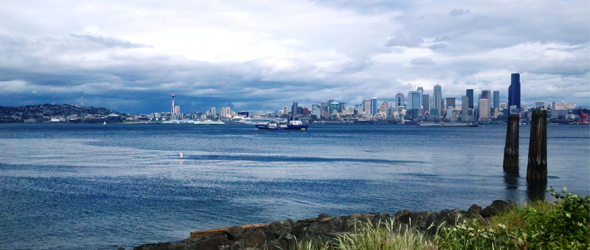

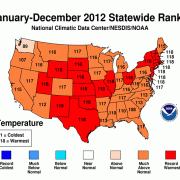




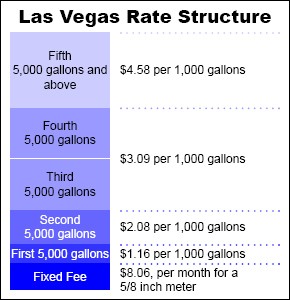
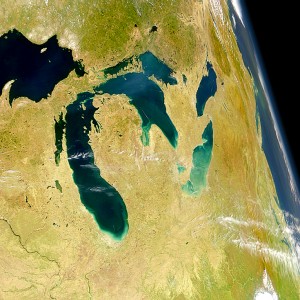
Interesting article and tough problem. I wonder what businesses pay. I bet that average cost pricing (postage stamp pricing) subsidizes people who are spread out. Better to price by distance and encourage a more compact city.
$84 a year? That’s a lousy $7/month? I’m sorry, if you can’t afford to keep yourself and your family furnished with this essential aspect of life, you’re doing something terribly wrong. Then again, I know some of these folks’ priorities are out of order. No doubt they have money (or, more likely) food stamps for junk food at Wal*Mart and possibly cigarettes, too. But less than $100 a year for water is out of their reach? Sorry, I’m not buying it (and, apparently, when it comes to water, neither are they!).
That’s not the problem. The problem is all these vacant houses with the water still running, and the Detroit water department doesn’t know which houses are abusing the water source. Some of these people wont even report the water still running in these houses. They need to start digging up the water mains to people who never pay. How can a person get a bill for 5,000 dollars, and their water service is still on?
Why is this a problem? Whitey will pay for it! I have rental properties in De-shithole and just got done paying for a water bill on a rental property of $1200 and another one for $750. You see in De-shithole, if the renter doesn’t pay, they won’t shut off the water on the tenant — they let them run up a bill and move out, then bill the landlord. Great system. Don’t pay, they put it on your taxes; don’t pay, they take the house! Both tenants had water running for free for over a year… you do that in the burbs, you would have been shut off long ago.
This one is just a bit ridiculous. Average bill in Detroit, according to this article is $83 / YEAR! That’s $0.23 / day. Really…. Give me a break. Anyone who isn’t paying that and owns a house that is being billed this amount is simply stupid, hands down. NEXT….. And I’m a bleeding heart liberal.
The quoted typical bill in the article was the minimum bill. The correct values as of August 2014 are $6.30 per month minimum charger plus water use at $21.71 per 1,000 cubic feet. If you have a water meter you will also pay a sewer charge of $5.47 per month plus water disposal at $46.26 per 1,000 cubic feet and a drainage charge of $18.11 per month, for a total of $30 per month minimum charge. If you use just over the minimum of 1,000 CF/month (250 gallons per day) the total bill is $21.71 + $46.26 + 18.11 = $86. Thus, some households go from $30 to $86 per month for having a tad more water use. Now that is unfair, but is still affordable.